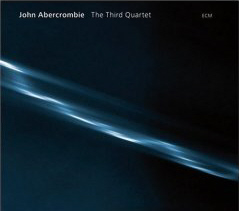Review by Brad Walseth
Despite appearing on a plethora of jazz recordings over several decades, guitarist John Abercrombie is a somewhat underappreciated master. This may be because the complex and thoughtful intricacies inherent in his style of sensitive and lyrically subtle playing may not be immediately apparent through casual listening. Like his musical forebear - Jim Hall, Abercrombie eschews speed and in-your-face pyrotechnics, in favor of graceful servitude to the music as a whole, and the dreamy landscapes he produces are prime examples of chamber jazz. On his third outing with his current quartet - the aptly titled "The Third Quartet," the guitarist appears to have ripened his musical brew with ambrosial results for the Epicurean listener.
"Banshee" opens the recording with expressive drum innovator Joey Baron leading the way and Abercrombie's truncated blues-fusion riffs heightening the tension. "Number 9" is a beautifully lilting piece with a memorable essence, while "Vingt Six" echoes Eastern European classical music - with Abercrombie playing intricate arpeggios while violist Mark Feldman resonates in layers over the top. Throughout the recording it is Feldman who plays the role as primary foil for the guitarist/leader - and their interplay after ten years together is remarkably in tune with one another. Feldman's style brings to mind Stephane Grapelli - and there are numerous instances of gypsy-flavored coloring in the fiddler's streams of expression. Meanwhile the understated "Wishing Bell" offers up 4th member bassist Marc Johnson a fine solo spot.
Swirling between free improvisation and highly arranged song forms, "The Third Quartet" is composed primarily of intelligent and sensitive originals. The exceptions are a cover of Ornette Coleman's "Round Trip" and Bill Evan's "Epilogue." Quite appropriate choices since clearly both artists were influential in Abercrombie's development. Another musical hero is lauded in the guitarist's groovy "Elvin" - a swinging tribute to the late drummer Elvin Jones. The watertight rhythm section of Johnson and Baron move from freeform reactive playing to jazzy swing without hesitation and provide the platform for soloists Abercrombie and Feldman to exchange radiant melodic conversations that seem to hang in the air long after the music has ended.
"The Third Quartet" offers an opportunity to savor the cunning of a highly-skilled artist, who perhaps understands the value of space in his playing more than any other living jazz guitarist today, and who has surrounded himself with musicians harmonious to the guitarist's goal of expanding the borders of modern jazz music.
|

